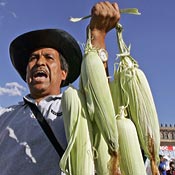Earlier this month, Mexican officials announced they expect the economy to grow by 3.4% in 2010. Despite this projected growth, much of the country is ravaged by poverty and inequality. Mexico has one of the most disparate wealth distributions in the entire world. NAFTA is largely to blame.
When President Bill Clinton implemented the North American Free Trade Agreement I don’t think he knew its implications for Mexico’s poorest citizens. At least, I hope he didn’t.
Signed into law in 1992, NAFTA is a tripartite agreement between Mexico, Canada, and the United States stipulating the equal flow of goods between the countries. Although well-intended, the sudden influx of drastically discounted goods into Mexico crippled farmers and indigenous populations who have survived off the profits of their land for centuries.
NAFTA quickly put the majority of rural farmers out of business.

Corn subsidies only exacerbated the problem of selling products in the local market. Seed prices are up 20%. In February of 2008, hundreds of thousands of Mexican farmers rallied in the streets of Mexico City, the nation’s capital to protest the corn subsidy.
Corn is not the only crop that has gone to pot since NAFTA began, literally.
According to an article in La Jornada, the relationship between the signing of the bill and drug trafficking has become tighter. In places such as Oaxaca, Chiapas, and Veracruz, the growth of marijuana and poppy seed has increased with unprecedented intensity. 1/3 of all arable and permanent croplands in Mexico are used to grow illicit substances. (I will explain more about the War on Drugs in later posts.)
While it is true the Mexican economy as a whole has made slight gains in the years since NAFTA, the campeñeros are bearing the brunt of this preferential agreement between the United States and Mexico.